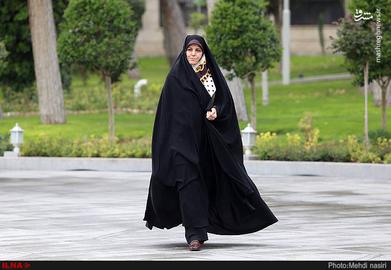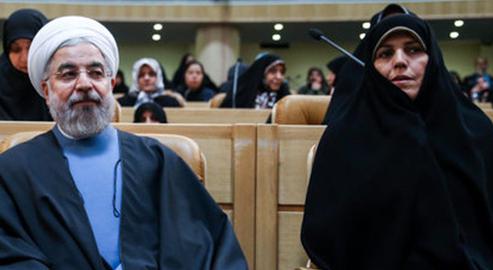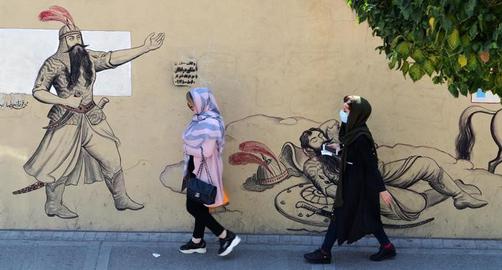Shahindokht Molaverdi, President Hassan Rouhani’s former vice president for women and family affairs and his former aide in citizens affairs, has been sentenced to two and a half years in prison.
The charges against her include “revealing classified information and documents with the aim of undermining national security,” “propaganda against the regime” and “promotion of corruption, prostitution and encouraging individuals to sexual deviancy.” Molaverdi has announced that she will appeal the verdict.
While serving in Rouhani’s administration, Molaverdi was continuously under attack by religious extremists and the country's conservative media. Eventually, on November 24, 2018, she resigned from her post and retired. IranWire published the following report on her controversial statements and activities after her resignation and we reprint it here to provide some background to her prison sentence.
***
When Shahindokht Molaverdi resigned, she said she planned to retire. But in her letter of resignation, she voiced her protest against the law banning the employment of individuals over the retirement age and stated: “the ban on political participation is a violation of a basic human right.” In an impersonal, formal letter, Rouhani accepted her resignation.
But even before her resignation, Molaverdi did not play an active role in Rouhani’s second administration and her job as an aide was simply ceremonial.
Shortly before her resignation, a number of reformists had suggested that Molaverdi should be appointed governor of Razavi Khorasan province but, on November 19, she expressed surprise at this proposal. Earlier, it had been suggested that she be appointed governor of South Khorasan.
Molaverdi was 53 years old when she retired, and she said in her letter that she was not subject to the law banning the employment of individuals over the retirement age. She chose early retirement during the presidency of Mahmoud Ahmadinejad, as a number of officials from President Khatami’s administration also did. In an interview with the newspaper Etemad, Molaverdi said that, under Ahmadinejad, she had taken a one-year leave of absence without pay but the “atmosphere was so constrictive” she was “forced” to take early retirement.
During the presidency of Mohammad Khatami, Molaverdi was the director of International Affairs at the Center for Women and Family Participation and then managed her own law office in Tehran. She stated in an interview that her family was against her returning to government and when she accepted Rouhani’s offer to be one of his vice presidents, her daughters, she said, protested by “not leaving their rooms for three whole days.”
“No Longer Defensible”
Molaverdi’s letter of resignation outlined her grievances. In her interviews, she had said that excluding women and young people from Rouhani’s second administration was "no longer defensible.”
Zahra Shojaei, who was the director of the Center for Women and Family Participation under President Khatami, has said that Rouhani had offered her the job of vice president for women and family affairs, but she had suggested Molaverdi. In the meantime, the situation had changed when it came to women’s demands and Molaverdi was more in the public eye than Shojaei had been. This was partly due to Molaverdi’s relatively straightforward statements, her demeanor and her presence on social media.
Unlike a number of other Islamic Republic officials, she said that during the 1979 Islamic Revolution, when she was 13, she knew nothing about politics and she had heard Ayatollah Khomeini’s name only once when she in fifth grade at primary school. She has also said that she never engaged in activities that young people normally take part in and that there is still discrimination between boys and girls when it comes to these activities.
Molaverdi’s stances on certain issues put her in the crosshairs of Iran’s principlist conservative media. This included her criticism of the decision to deploy 7,000 undercover security police, her criticism of the sale of unborn babies, her advocacy for changing the law that requires a husband’s permission before a wife can leave the country, her support for women to be allowed into sports stadiums and her opposition to sexual quotas.
She also said that hijab laws “need serious revision” because they were outdated. Any action regarding hijab and chastity must safeguard and respect human dignity, she argued. Hijab should not be treated as a “security” issue.
Terrorizing the “Shrew”
The hardliner media accused Molaverdi of providing munition for “enemy media” and for Ahmed Shaheed, who was then the United Nations Special Rapporteur on the human rights situation in Iran. One of these media outlets was Yalasarat, a weekly published by the extremist organization Ansar-e Hezbollah, which called her a “shrew” and accused her of “invitation for prostitution under the guise of freedom.”
In response to Yalasarat, Molaverdi said that Ansar-e Hezbollah and the paper wanted to “terrorize” women and to remind them they are not immune even if they are vice president.
In the spring of 2016 Molaverdi was summoned to court for comments following an execution carried out in Sistan and Baluchistan province. “There is a village in Sistan and Baluchistan where all the men have been executed,” she said. “Their survivors are now potential smugglers, both to avenge their fathers and to provide a livelihood for their families, but nobody is supporting these families.”
Judiciary officials, however, claimed Molaverdi was criticizing the high number of executions and the Justice Bureau of Sistan and Baluchistan accused her of “spreading lies and libel.”
Just before the presidential election of 2017, Fatemeh Alia, the head of presidential candidate Ebrahim Raeesi’s Women’s Committee, accused Molaverdi of providing the UN with information about divorced women between the ages of 20 and 25 for the purpose of prostitution in the Turkish resort city of Antalya.
Views differ about the performance of Shahindokht Molaverdi as the vice president for women’s affairs. Some believe that during her tenure there were no meaningful changes regarding the situation for women. Molavardi herself has said that her job consisted mostly of coordination between various government agencies and it was not a ministry that had the authority to make decisions on its own.
One example is the arrest and four-year imprisonment of Nizar Zakka. In 2015, Molaverdi invited Zakka, an information and communications technology expert, to speak at the second annual International Conference on the Role of Women in Sustainable Development. Zakka, who is a Lebanese citizen and US resident, traveled to Tehran and took part in the conference. On his way to the airport, Revolutionary Guards agents stopped him and arrested him. For several days, no information was provided about his whereabouts. He was later charged with espionage and given a 10-year prison sentence. He was released in 2019, and has described how he was regularly tortured while in prison.
Earlier this year, IranWire founder and director Maziar Bahari made a film about Nizar Zakka’s ordeal. In The Treacherous Host, Bahari and Zakka contact Shahindokht Molaverdi and ask her why she failed to speak up for Zakka and protect him since she had personally invited him to the country. “Your case was in the hands of the judicial and security apparatus,” Molaverdi told Zakka. "We do not know anything. We heard about it on the news ... During those four years, we did what we could ... But it was not in our hands or in the government’s hands. It was in the hands of the judicial and security apparatus. We really didn’t know what was happening ... We did not know such a thing would happen.”
Changing the Discourse
“It cannot be said that we had a tangible output like a ministry,“ Molaverdi said of her time as vice president, “but we drew a clear map of how the affairs of women and families should move forward. Everybody concedes that, during this period, there was a change in the discourse about women and families.”
Initiatives put forward during Molaverdi’s tenure as vice president include a bill for a “national authority to protect and support women against violence,” a proposal for alternative punishments for drug-addicted women who had been sentenced to less than 91 days in prison, and a request to allocate funds for women who had been victims of acid attacks.
“They tried a lot to push us to the sidelines and to deny us the opportunity to fulfill our main mission,” she said. “I even believe that, had I remained in that job, such obstruction would have become worse. Of course, if I had stayed as the vice president for women’s affairs, I was ready to take on these obstructions.”
But, in the end, President Rouhani re-assigned Molaverdi as he started his second term, appointing her as an aide, a largely ceremonial position. Even so, she continued to be vocal in her support for women’s rights. For instance, in 2018 she announced she was trying to secure the release of the so-called “Revolution Street Women,” a movement of women who removed their hijabs in public to protest against Iran’s mandatory hijab law and the heavy-handed ways authorities enforced it. She also said she had sent letters to security agencies responsible for shuttering and forcing the closure of Baha’i businesses.
Molaverdi’s husband Hamid Ayati ran as a candidate in the 2016 parliamentary elections. The media reported that Ayati, a lawyer and the president of the Research Institute of Culture, Arts and Architecture, was trying to use the support and influence of his wife to enter parliament. But Ayati’s bid did not progress and his name was also left off the list of reformist candidates running for Tehran City Council.
During the same elections, principlist conservative media outlets published a photograph of Molaverdi and Ayati visiting Mostafa Tajzadeh, President Khatami’s advisor, who had been released after serving a prison term from 2009 to 2016 for "assembly and collusion against national security" and "propaganda against the regime". Molaverdi received harsh criticism for the visit.
When Rouhani failed to appoint a female cabinet minister in his second term, Molaverdi said, “the most optimistic interpretation” was to view this as “‘marching in place’ instead of ‘marching backwards’.”
As a result of this “marching in place,” Molaverdi joined the ranks of other women who have tried to improve the lot of women within the framework of the Islamic Republic. In her letter of resignation, Molaverdi begged the forgiveness of each and every citizen for all her failures and shortcomings in meeting the expectations despite “all my efforts and endeavors.”
Related coverage:
A Government Feminist Bids a Sad Goodbye
visit the accountability section
In this section of Iran Wire, you can contact the officials and launch your campaign for various problems


























comments